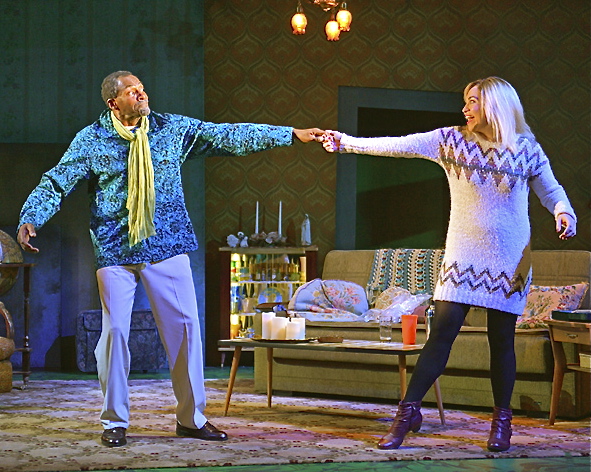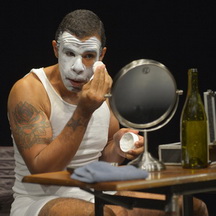London outsiders find common ground at ACT
“Nat has the answer to everything,” the aging Alfred, in Kwame Kwei-Armah’s Let There Be Love, now at A.C.T., passionately asserts. The Nat in question happens to be Nat King Cole, so anyone who is a Cole fan knows just what Alfred means; the jazz singer’s velvet voice can soothe just about any troubled waters.
The waters in Kwei-Armah’s drama are troubled indeed, mostly by Alfred himself. The play may remind you of Driving Miss Daisy, in which a proud, cantankerous old Jewish woman woman has to yield to the help of a black man hired by her son to chauffeur her about. Roles and sexes are reversed in Let There Be Love, which is set in London. The troublesome oldster is a black West Indian immigrant, and it’s his daughter, Gemma, who, seeing he needs help when he returns home from hospital (he stubbornly refuses to reveal why he was there), finds him a caregiver: Maria, a young blonde Polish woman recently arrived in England.
Within moments both plays signal the shape they’ll take: we’ll watch a mismatched pair accommodate, then grow close, and the message will be, “All men are brothers,” or, in today’s more embracing parlance, “All persons are siblings.” The danger is a descent into obviousness and easy sentimentality, with pat-yourself-on-the back virtue as the audience’s reward, but happily both plays sidestep these pitfalls. Though each focuses on the grace of hard-won friendship, and neither is soft-headed, Kwei-Armah’s play, marked by a thornier core problem and greater surprises, is, I think, the better of the two,.
How we choose to die is its central issue.
Though he’s ill, Alfred is decently well-off, with enough money in the bank to sustain him, but, disapproving of his daughter’s lesbianism (he calls her names that shocked even nearly unshockable me), he won’t help her out of a financial tight spot. He’s a selfish meany, but he has a heart, and we yield grudgingly to him when, learning his caregiver, Maria, has been socked by her boy friend, he decides to help her, allowing her to live not only in his colorfully decorated flat but in his heart as well.
This pair of immigrants bond in scenes that mingle rancor with humor. There are lots of laughs in the play but there’s a dark undertow as well. Alfred has been throwing away his meds, all except for his oxycontin, which he hoards, and his plans for it are not hard to guess.
Maria Mileaf directs this poignant dance of love and death expertly, supported by a fine creative team: Daniel Ostling, who designed the colorfully patterned set; sound man Bart Fassbender, who puts Nat King Cole (“Let There Be love”) on the soundtrack , Lydia Tanji who designed the fine costumes, and Russel H. Champa, who lights scenes gracefully.
Carl Lumbley gives a rich, reverberant performance as Alfred. He tunes us in to Alfred’s angry fierceness and helps us see that he gives up on life only when it wrestles him to the ground. As Maria, Greta Wohlrabe is nervy, vulnerable, funny–a survivor. Donetta Lavinia Grays is grittily vivid as Alfred’s put-upon daughter, Gemma.
Let There Be Love plays on Geary Street until May 3rd, followed by Stephen Sondheim’s A Little Night Music. A Gala, featuring Alan Cumming, to celebrate the opening of ACT’s Strand Theater, takes place April 25th. For tickets/information call 415-439-2470 or visit www.act-sf.org
–ROBERT HALL
